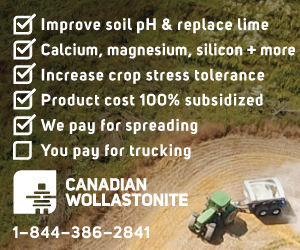The Big Picture: A challenging future
BOOK HIGHLIGHTS WORRISOME TRENDS AND FUTURE CONCERNS FOR THE AGRICULTURAL INDUSTRY
although the title may be apocalyptic, don’t let that scare you away. Published in 2008 by the author of The End of Oil, farmers and consumers alike should read The End of Food for a clearer understanding of the health of the food value chain that brings food from field to fork or “food economy”.
The author, Paul Roberts, takes an in-depth look at the past and current food economy by delving into seemingly every major food issue that the globe has faced in the past century: over-production, hunger, technological change, organic and alternative agriculture, environmental impacts and the vagaries of a market always on the hunt for something bigger and better.
These topics are explored with an unbiased balance that is often lacking in debates surrounding food and farming. Roberts analyzes all aspects of our food economy with the same logical lens; organic agriculture is just as scrutinized as conventional and consumers are forced to take just as much responsibility as corporations.
why you should read it
Although it is all too easy to become narrowly-focused on your own operation, understanding broader agricultural issues can pay off for farmers. The book clearly outlines challenges the agricultural sector will face in the near future. According to Roberts, farmers will have to find a way to produce more food with less water, less petroleum, less energy and on fewer acres. For instance, Roberts claims that nearly half of recent food production output and two-thirds of recent population growth are a direct result of the availability of synthetic nitrogen. With rapidly rising petroleum costs, Roberts brings to light worrisome questions about the future of the sector.
Additionally valuable is the explanation Roberts offers for the aiding and abetting of over-production by subsidies in the US and farmers’ seemingly unstoppable ‘race to the bottom.’ As most farmers are keenly aware, success from commodity markets is often determined by the scale of the operation; as prices decrease, farmers work hard for higher yields from lower inputs in order to make ends meet. The End of Food provides significant insight as to how such a system was created and explains how each step in the value chain is under similar stress.
food for thought
Not exactly a ‘feel good read,’ The End of Food paints a fairly bleak future for farmers, food processors and consumers alike. Roberts asks tough questions of all sectors of the food industry. Although it is recognized that for many in our sector, farmers included, larger economic conditions are a significant factor in their practices, Roberts is unapologetic in his questioning of standard practices of the value chain.
However, not all is bleak. Roberts does recognize those working hard to create a better outcome for the food industry. Specifically, Roberts talks about the benefits of no-till farming on the environment. Although it is recognized that this, among other solutions presented, is not a cure-all for the industry, Roberts does give credit where credit is due.
Ultimately, although The End of Food avoids taking the easy way out and claiming one agricultural practice as the magic bullet solution to all of our problems, Roberts fails to provide any meaningful solutions of his own.
If you are looking for a well-rounded book about the food industry, how it works and how it doesn’t work, this is certainly the book for you. You may not find answers within the book to many of the problems he identifies but there are some good questions asked that everyone working in the food system should consider. •







